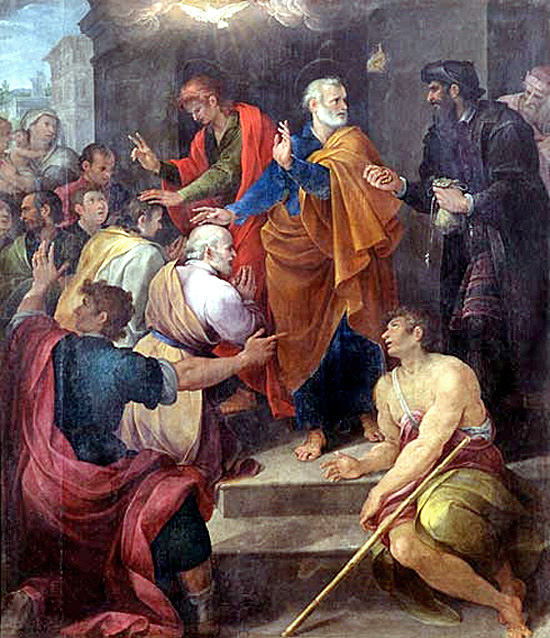 Tuesday in the Octave of Pentecost. Another little ramble.
Tuesday in the Octave of Pentecost. Another little ramble.
The Octave has Roman Stations. As the last two days honored St. Peter at churches bearing his name, one would expect now that St. Paul, the Apostle to the Gentiles should be acknowledged with a trip to St. Paul’s outside the walls. However, because – as I can attest at the very moment I am writing this – it is blazing hot in the sun at this time of year – the Station was fixed at the important St. Anastasia, a church of the imperial court in the Greek and Byzantine section of the City near the markets and below the Palatine Hill.
The Octave was developed in Rome when there was strong Greek, Byzantine presence. So, it makes a measure of sense that the Introit would be from a Greek apocryphal book 4 Esdras.
In Acts 8 we read that Saul was still ravaging the Church, even going house to house and dragging people off to prison. Deacon Philip, in Samaria, was preaching and exorcizing and healing: remember that curing illness went hand in hand with exorcism. Philip baptized, but it was necessary for Apostles, Peter and John, to come to confer the Holy Spirit.
This is when a certain Simon tried to buy the power to confer the Holy Spirit, thus giving rise to the term “simony” for the selling and buying of spiritual goods. Then in Acts 8 Deacon Philip gets a directive from an angel to go find the Ethiopian Eunuch, thus giving rise to the great image found in the traditional blessing of vehicles. Thereafter, Philip gets whipped away by the angel to Azotus, bringing chapter 8 to a close.
Notice that yesterday Mass ended with a prayer for protection against the fury of enemies. The chapter of Acts we hear from today doesn’t begin with the first verses, but people knew their Scripture well. They knew what was going on in Acts 8 and that Saul was ravaging the Church.
We just learned that Nigeria Muslim terrorists killed over 50 people in an attack on a church during Mass on Pentecost Sunday.
As bad as that is, what is worse is the active erosion by priests and bishops of the church in the belief and practice of sound Christian morals on the part of their flocks. It is one thing to slay the body. It is another to endanger the soul.
Good shepherds?
Curiously, there is a good shepherd parable in the Gospel. In the traditional lectionary for Mass, there are various “Shepherd Masses”, as it were, and they pop up around the beginning of new seasons, for example, Monday after the 1st Sunday of Lent, Second Sunday after Easter, third Sunday after Pentecost. The Gospel today is from John 10.
Our Lord says today, ““Truly, truly, I say to you, he who does not enter the sheepfold by the door but climbs in by another way, that man is a thief and a robber;…”
I can’t help but think that those who put together the ancient Lectionary (0f the Vetus Ordo Mass) knew the context of Acts 8 and Simon and his “simony”. The Gospel concludes with the ominous: “The thief comes only to steal and kill and destroy; I came that they may have life, and have it abundantly.”
Again, the emphases on an enemy at this happy time of the Octave.
The Collect today:
Adsit nobis, qu?sumus, Dómine, virtus Spíritus Sancti: quæ et corda nostra cleménter expúrget, et ab ómnibus tueátur advérsis.
Let the power of the Holy Spirit be present within us, O Lord: that It may graciously cleanse our hearts and guard us from all adversaries.
Guard us.
That’s what a good shepherd does. A good shepherd protects the sheepfold, gives them good water, good pasturing for nourishment.
Before Christ ascended He said He would send not just an advocate, a parakletos, but another parakletos. A parakletos is someone who stands by you, protects you under fire, counsels and guides, in fact shepherds you through perils. Christ is the 1st parakletos and the Holy Spirit is 2nd, showing how the work of the Trinity is present in each of the Persons, though for our understanding it is “teased out”.
Pray for an abundant outpouring of the parakletos on your priests and bishops, perhaps even to covert the hearts and illumine their minds so that they leave their enervating appearance of action in the Church and move to concrete work consonant with the Tradition handed down to us by true men of action in our forebears. Pray for a softening of the rigidity of hatred for the ways of our forefathers especially in liturgical practice.

































